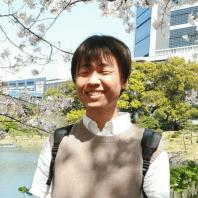![]()
![]()
Research Support Office Research Advancement Division. Tokyo University of Agriculture and Technology
| TEL | +81-42-367-5944 |
|---|---|
| FAX | +81-42-367-5946 |
This program is supported by MEXT’s scientific technology human resource development fee grant, "Program to Disseminate Tenure Tracking System".
Home > Tenured Faculties > Nakayama Yu

Nakayama Yu

| Affiliation | Institute of Engineering |
|---|---|
| Division | Division of Advanced Information Technology and Computer Science |
| Research field | Computer Systems Engineering |
| Keyword(S) | Adaptive network, Network architecture, Packet switching, Mobile sensing |
| Url | http://web.tuat.ac.jp/~yu-nakayama/ |
| Research experience | ・Apr. 2008 - Aug. 2018: NTT Corporation |
|---|---|
| Educational background | ・Mar. 2006: B.Agr, Faculty of Agriculture, The University of Tokyo |
| Awards | * The latest information is shown at the member's website. |
| Selected papers and publications | * The latest information is shown at the member's website. |
With the spread of mobile devices such as smartphones and IoT devices, our lives are becoming increasingly convenient. The introduction of new services such as automated driving and MR (Mixed Reality) will continue in the future, and it is thought that the communication network will become more important as a social infrastructure. Mobile communication traffic continues to explosively increase and spatio-temporal fluctuations become remarkable. As a consequence, the efficiency and financial viability of conventional mobile networks are drastically deteriorated.
Based on this background, we are researching technologies related to next-generation networks and applications, and mechanisms to utilize them well. For example, we are considering to construct communication network more openly and efficiently by adopting methods such as crowdsourcing and sharing economy. In addition to research on low-latency traffic forwarding technology to provide highly real-time applications, we also want to advance research on responding to social issues such as population decline, disaster prevention, and biodiversity conservation.
I think it is a very welcome system for young researchers because it is valuable to have an opportunity to become a principal investigator at an early stage. In addition, I think that it is a very good environment that can be recommended to other young researchers, as there is sufficient support for budgeting and acquisition of tenure. I hope this project will continue in the future, and such a system should be widely disseminated.
I would like to work at my own pace without forgetting my first thought.